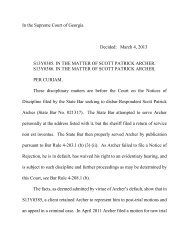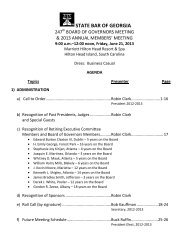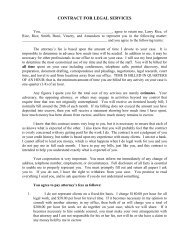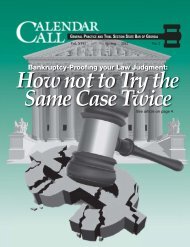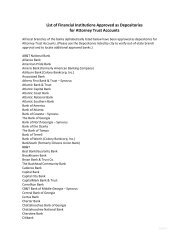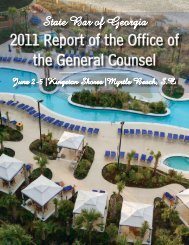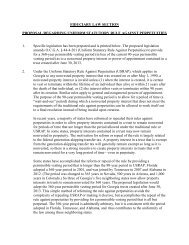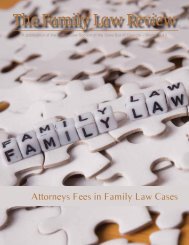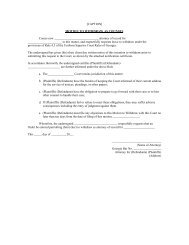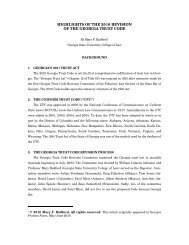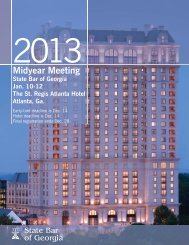2008 Amendments to the Uniform Interstate Family Support Act ...
2008 Amendments to the Uniform Interstate Family Support Act ...
2008 Amendments to the Uniform Interstate Family Support Act ...
You also want an ePaper? Increase the reach of your titles
YUMPU automatically turns print PDFs into web optimized ePapers that Google loves.
<strong>the</strong> registered support order, <strong>the</strong> registering tribunal shall schedule <strong>the</strong> matter for hearing and<br />
give notice <strong>to</strong> <strong>the</strong> parties of <strong>the</strong> date, time, and place of <strong>the</strong> hearing.<br />
Comment<br />
Subsection (a) directs <strong>the</strong> “nonregistering party” <strong>to</strong> contest <strong>the</strong> registration of an interstate<br />
support order or a foreign support order not subject <strong>to</strong> <strong>the</strong> Convention within a short period of<br />
time or forfeit <strong>the</strong> opportunity <strong>to</strong> contest. As noted in Section 605, that time frame is extended<br />
for cases subject <strong>to</strong> <strong>the</strong> Convention.<br />
Notice of registration is <strong>the</strong> first step for enforcement or modification of ano<strong>the</strong>r state’s<br />
child-support order. Once <strong>the</strong> nonregistering party is put on notice of <strong>the</strong> registration, if an error<br />
allegedly has been made, <strong>the</strong> second step is crucial. The nonregistering party is required <strong>to</strong> assert<br />
any existing defense <strong>to</strong> <strong>the</strong> alleged controlling order, or forfeit <strong>the</strong> opportunity <strong>to</strong> contest <strong>the</strong><br />
allegations. Note that ei<strong>the</strong>r <strong>the</strong> obligor or <strong>the</strong> obligee may have objections <strong>to</strong> <strong>the</strong> registered<br />
order, although in <strong>the</strong> vast majority of cases <strong>the</strong> obligor is <strong>the</strong> nonregistering party. On <strong>the</strong> o<strong>the</strong>r<br />
hand, <strong>the</strong>re is a possibility that in multiple-order situations ei<strong>the</strong>r party may register <strong>the</strong> order<br />
most favorable <strong>to</strong> that party ra<strong>the</strong>r than <strong>the</strong> likely controlling order, thus triggering a contest.<br />
While chicanery is contrary <strong>to</strong> Subsection 605(c), and specifically forbidden for a support<br />
enforcement agency, Subsection 307(c), <strong>the</strong>re may be an honest difference of opinion as <strong>to</strong><br />
which order controls. The nonregistering obligor has a significant stake in assuring <strong>the</strong> arrears<br />
are correctly stated.<br />
Under UIFSA a contest of <strong>the</strong> fundamental provisions of <strong>the</strong> registered order is not<br />
permitted in <strong>the</strong> responding state. The nonregistering party must return <strong>to</strong> <strong>the</strong> issuing state or<br />
foreign country <strong>to</strong> prosecute such a contest (obviously only as <strong>the</strong> law of that state or foreign<br />
country permits). This approach is akin <strong>to</strong> <strong>the</strong> prohibition found in Section 315 against asserting<br />
a nonparentage defense in a UIFSA proceeding. There is no attempt by UIFSA <strong>to</strong> preclude a<br />
collateral attack on <strong>the</strong> support order from being litigated in <strong>the</strong> appropriate forum.<br />
Subsection (b) precludes an untimely contest of a registered support order.<br />
Subsection (c) directs that a hearing be scheduled when <strong>the</strong> nonregistering party contests<br />
some aspect of <strong>the</strong> registration. At present, federal regulations govern <strong>the</strong> allowable time frames<br />
for contesting income withholding in Title IV-D cases. See 42 U.S.C. Section 666(b).<br />
Related <strong>to</strong> Convention: art. 20. Bases for recognition and enforcement; art. 22. Grounds<br />
for refusing recognition and enforcement; art. 23. Procedure on an application for recognition<br />
and enforcement; art. 26. Procedure on an application for recognition.<br />
SECTION 607. CONTEST OF REGISTRATION OR ENFORCEMENT.<br />
(a) A party contesting <strong>the</strong> validity or enforcement of a registered support order or seeking<br />
136



